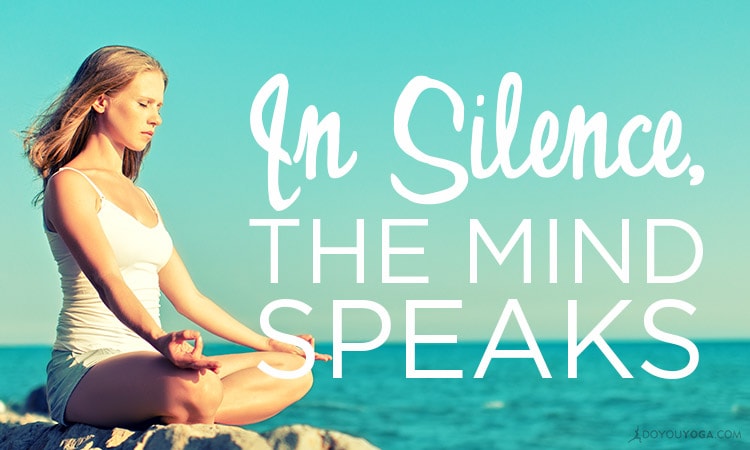Is it possible to survive 10 days without talking, a week without TV, or even three days without making eye contact with another human being? Step away from the cell phone and listen carefully, because a silent meditation retreat could change your life.
As a yogi, you’ve most probably tried meditation. But did you ever try to meditate for five hours – or even 10 days – straight? Without the get-out-clause of a chat with your best friend at the end of it, or a quick check of your emails halfway through? Here’s how vipassana is taking the world by silent storm.
Shut Up and Listen (To Yourself)
A vipassana, silent meditation, mindful meditation, or insight meditation retreat is up to 10 days of intense meditation practice where talking and all forms of communication with other students is banned. At the end of the experience, aficionados claim to be energized, creatively inspired and able to access a deep well of joy.
Silent meditation retreats are based on the practice of vipassana, “to see things as they really are,” and a focus on the intense interconnection between body and mind. Retreats are run on a non-charge, non-profit basis for anyone to attend – so long as they abide by the rules and regulations and stay for the entire meditation period. The idea is that participants gain awareness, self-control, and peace through turning inward with meditation.
Less Spa, More Inner Space
If, for you, meditation is the time between appointments that you spend with your eyes closed and a bar of chocolate, then you’re in for a shock when you step through the doors of the meditation retreat, which could take place in a center anywhere from Thailand to New Mexico. But here’s another thing — being quiet is not the only requirement.
Firstly, you won’t be able to enjoy that chocolate bar. Secondly, you’ll be waking up close to 4am each day and spending until 9pm in lectures and silent contemplation – a silent meditation retreat is not a spa vacation; you need to work hard, mentally and physically, to gain from this practice. And it goes without saying that the cocktails are out.
Are Silent Meditation Retreats For You?
Every meditation retreat has a set of rules for all participants. The code of conduct is designed to calm the mind and reduce the distractions that could harm your meditation practice. The basics may seem obvious – abstinence from killing, stealing, sexual activity, lying, and taking any intoxicating substance – but there are extra conditions.
You must also abstain from eating after midday, not decorate your body with jewelry, fancy clothes or makeup, and abstain from sleeping in a luxurious bed. Often, men and women are separated and physical contact is prohibited. Different retreats vary in terms of the exact regulations but with any option, if you’re not willing to make a determined effort, then this experience might not be for you.
Soundless Effects
How does a silent retreat claim to help you live your life?
First, you calm your mind so self-observation becomes possible. Next, you fix your attention on the breath entering and leaving your body. By day four, your mind is more focused. You notice small details. You hear tiny sounds in the grass. You find your way through the inevitable boredom and come out of the other side with greater clarity.
You may also learn to more deeply appreciate the food you eat and even the water you sip. You feel all you need to feel without moving away from the pain or the discomfort – being silent gives you the certainty that emotions do not last forever and pain passes through.
Sssshhhhhh…..
When you step away from the ceaseless distractions of modern life – bleeping cell phones, TVs, PCs, kids clamoring to be heard and spouses wanting your attention – your mind slows down. Some people even use silent meditation retreats to rid themselves of addictions.
Outsiders may view a silent meditation retreat as strikingly close to being a prison camp, but attendees that have survived – and thrived – through the 10 days claim to be changed souls. Many people return to experience silent meditation every year as a way of coping with the hardships of everyday life, easing depression, becoming more aware, and being able to fully exist in the moment – without relying on the clamor of modern life to drown out their inner voice.


